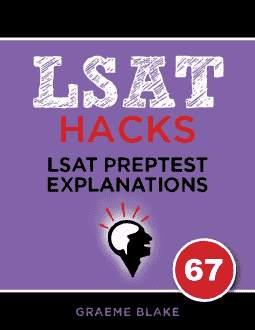QUESTION TEXT: Astronomer: Earth was bombarded repeatedly by comets…
QUESTION TYPE: Role in Argument
CONCLUSION: Life on Earth may have started when a Martian meteorite carried microbes to Earth.
REASONING: Earth used to be sterile. Mars could have had life at that time. Many meteorites from Mars bombarded Earth.
ANALYSIS: I couldn’t prephrase this one. I scanned the answers and saw there were two questions:
- Was there justification for saying that there could have been life on Mars?
- Was life on Mars necessary, sufficient or neither for the argument’s conclusion?
The justification for the claim is that Mars wasn’t sterilized. Mars could have had life.
This is a necessary condition for the argument. Mars couldn’t send life unless Mars had life. But it’s not sufficient. Just because you have life doesn’t mean you would send it.
___________
- There is some justification. We know Mars wasn’t sterilized by asteroid bombardment. That’s not proof that Mars did have life, but it’s evidence Mars could have had life. The second half of this answer is right.
- This has the same problem as A, and the second half is wrong too. Even if Mars could have had life, that doesn’t ensure that a meteorite would have carried it to Earth.
- CORRECT. The justification is that Mars was not sterilized by bombardment. The fact that Mars could have had life is necessary. Otherwise how could Mars have sent life to Earth?
- The first part is a bit strong. The language in C (‘some justification’) is better. The argument didn’t prove this point very well. Second, the conclusion is not justified. The fact that Mars might have had life doesn’t establish that the life could have reached Earth.
- Wrong. The possibility of life on Mars is definitely required for the argument’s conclusion. If there were no life on Mars, how could Mars have sent life to Earth?


What if meteorites from other planets crashes in space prior to landing on Earth? Doesn’t that make (E) a better answer choice in this kind of scenario?
That just doesn’t seem very likely. The same rock escapes from one planet, crashes elsewhere, then comes here? It’s best to avoid coming up with what-if scenarios. An answer is best if supported based on ALL likely scenarios, and not contingent on something highly specific and unlikely.
Note: This is an old comment but I wanted to clarify the point.
Hi Graeme, I’m a big fan of your explanations! Thanks for all you do! I struggled a little on this question, when I took PT 67 timed. I got caught between C and E.
C) made sense to me from a common sense logic approach.
My main issue here is that I thought that conditionally, premises were typically sufficient conditions with conclusions falling on the necessary end. So when C said that the highlighted text was REQUIRED, it threw me for a loop.
Without the conditional logic mumbo jumbo, I kind of even prephrased this answer choice. I said well yeah, this highlighted text needs to be true for the main conclusion to hold.
Additionally, I went for E) because I tried setting this up with conditional logic and thought that for a conclusion with a strength of “MAY” (as our stimulus has) that there really weren’t any guarantees here.
In reviewing I understand that if the highlighted text were NOT TRUE, then of course the conclusion could never be true. Thus, it is required. I’m just having some trouble wrapping my head around this one. Do you think you can help me figure out where I went wrong? Was there strict conditional logic here that I couldn’t diagram properly?
>conditionally, premises were typically sufficient conditions with conclusions falling on the necessary end.
This is perhaps helpful as a shortcut but it isn’t actually true. A lot of LSAT advice like that works until it doesn’t. There’s no requirement for premises to be sufficient and conclusions to be necessary. English is broad and varied and there are many styles of argument.
Ultimately you have to think about the context in question. The author is saying that meteors from Mars brought life from Mars to Earth. This is only possible IF there was life on Mars.
I simply wouldn’t use conditional logic on this question. It’s not a helpful tool for role in argument or identify the conclusion questions. You should be aware of conditional logic but not restrict yourself to it. It’s a tool rather than a necessity.
Note: This is an old comment but I wanted to clarify the point.